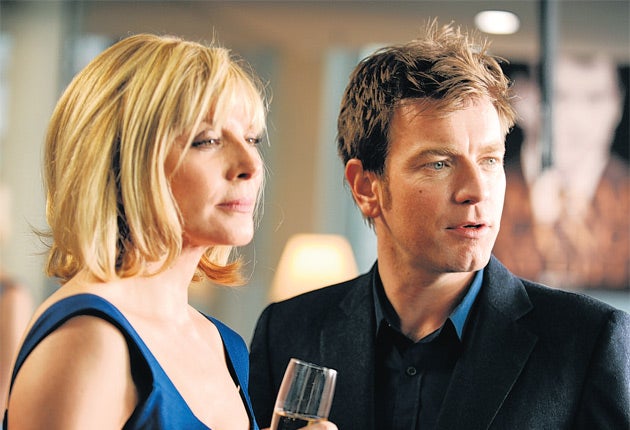
Given its subject matter, wintry settings and the ill omens under which it was made, one might expect The Ghost to be dark and brooding fare. In fact, by comparison with some of Roman Polanski's earlier work, this well-executed thriller is almost a lark. There is nothing here to match the morbidity of his version of Macbeth, the claustrophobic intensity of films like Repulsion and Cul De Sac or the bristling sexual tension and undercurrent of violence that ran through Knife in the Water. Nor is there anything as grim as the parts of The Pianist showing the degradation of the Warsaw ghetto. It would be stretching it to call the new film a John Buchan-style ripping yarn or a Polanski version of a Raymond Chandler detective yarn, but this is Polanski enjoying himself.
It is presumably not coincidence that The Ghost is released in British cinemas in the middle of the current UK election campaign. The Robert Harris novel on which it is is based has a strong political undertow. Harris is the former admirer and confidant of Tony Blair. The more Harris has insisted that his fictional creation Adam Lang is not directly based on Blair, the more commentators have noticed the resemblance between Lang and Blair. Lang (played with oleaginous charm by Pierce Brosnan in the film) is a former British prime minister holed away on an island off the coast of the US, "writing" his memoirs and facing down war-crime charges.
The opprobrium Lang faces in his exile is also something Polanski will recognise. He has been languishing under house arrest in Switzerland for several months, facing extradition to the US, after being apprehended by police en route to the Zurich Film Festival last September.
The film takes its tone from its main character, the cocksure, wisecracking "ghost writer", played by Ewan McGregor. The Scottish actor approaches the role with a bravado and insolence that, at times, even rekindles memories of his role as Renton in Trainspotting. An opportunist with no interest in politics, the writer at first takes everything – murder, corruption, evidence of US Neocon skulduggery, the attentions of Lang's overbearing wife (Olivia Williams), even being mugged – in his stride. He is a contemporary variation on the genial everyman heroes in Hitchcock thrillers who suddenly find themselves entangled in monstrously sinister and complex plots. True to genre convention, he is both pursuer and pursued. He is certain that his predecessor was murdered. By trying to find out why, he makes himself the quarry.
Polanski orchestrates affairs with verve and humour. He is equally adept at cranking up the tension and at staging chases. Polanski is also able to convey what it feels like to be in the glare of the world's media. Adam Lang, the plot suggests, was behind the rendition of terrorist suspects then tortured by the CIA. He is a smug and complacent figure, as duplicitous in his private as in his political life. Even so, we feel sympathy for him. "The pack is on the move," we're told as the press close in on him.
Olivia Williams excels as Lang's wronged and strong-willed wife, Ruth. She is sharp-tongued, but it very quickly becomes apparent that she is using irony and sarcasm to mask her own vulnerability.
Just occasionally, The Ghost feels clunky – closer to the world of a glossy Jeffrey Archer TV mini-series than to that of Chinatown. There is something strangely artificial about Lang's island hideaway house with its its minimalist design and hidden offices presided over by Lang's PA (Kim Cattrall, as a rather matronly femme fatale). The early scenes showing the mercenary, narcissistic world of London publishing are heavy handed. As the plot twists multiply and the ghost writer's paranoia intensifies, the characterisation becomes strained. The nuanced interplay between the writer, Lang and Lang's wife slowly gives way, to be replaced by a far broader style of storytelling. The political edge is blunted, too. The debate about whether a western political leader should be held legally accountable for war crimes is downplayed as we move into the realm of a far more conventional conspiracy thriller.
Still, as in Polanski's earlier films Frantic and Bitter Moon, there is a sense that the Polish director is parodying thriller conventions. With that surrealist Eastern European sensibility, he was never likely simply to make a thriller by numbers. He relishes throwing in unexpectedly lyrical and oddball touches – the eerily beautiful shot of the pages of a manuscript blowing away down a London street, the strange cameo from a very ancient Eli Wallach as an eccentric who lives by the shore.
The Ghost was apparently made almost as an afterthought. Polanski and Harris had originally intended to collaborate on an adaptation of Harris's novel Pompeii. When that fell through because of a strike in Hollywood, they turned to the other novel instead. This is an old-fashioned thriller in that it doesn't use juddering, hand-held camerawork and pays as much attention to character as to action. The Ghost may seem conventional, but it has a disorienting, offbeat quality that makes it stick in the mind.
Subscribe to Independent Premium to bookmark this article
Want to bookmark your favourite articles and stories to read or reference later? Start your Independent Premium subscription today.

Join our commenting forum
Join thought-provoking conversations, follow other Independent readers and see their replies